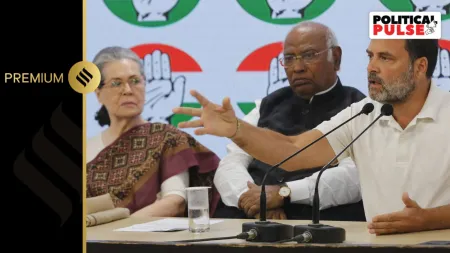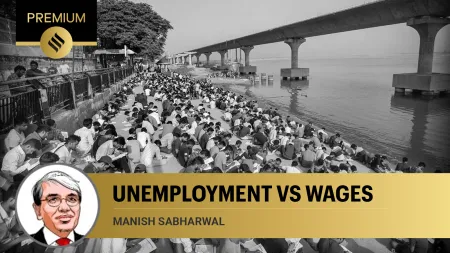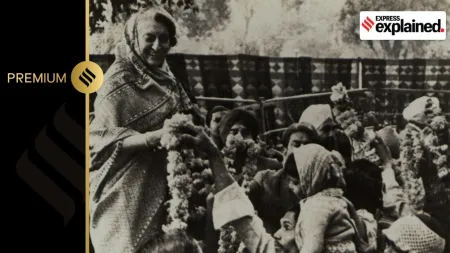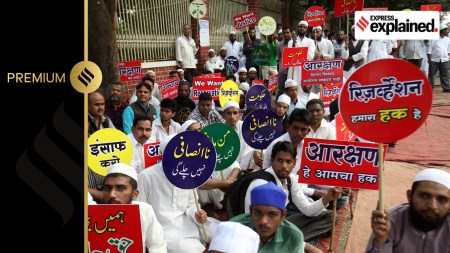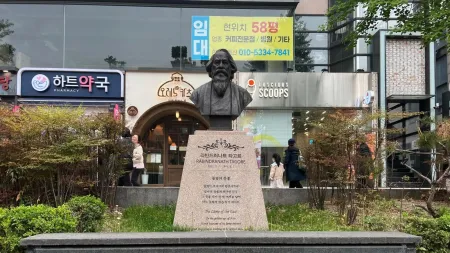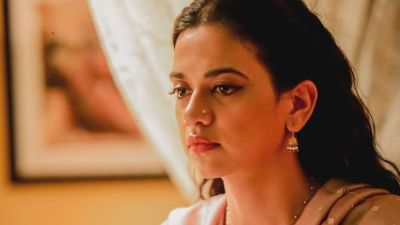- India
- International
Every single person is political: Aparna Sen on her new film Ghawre Bairey Aaj and the need for a moderate voice
Unlike the novel or Satyajit Ray’s film, where the politics of the author is not only blatant but his allegiance is foregrounded, Aparna Sen is more nuanced, less blatant in her adaptation of Gharey Bairey.
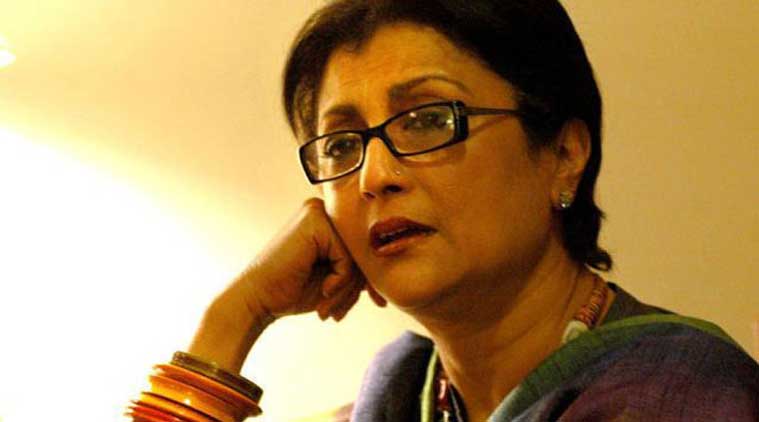 Aparna Sen’s new film, Ghawre Bairey Aaj premiered at the Jagran Film Festival, Delhi. (Source: File Photo)
Aparna Sen’s new film, Ghawre Bairey Aaj premiered at the Jagran Film Festival, Delhi. (Source: File Photo)
Aparna Sen apologises profusely for being late. She folds her hands and literally stoops for arriving twenty minutes later than the scheduled time for her session at the Jagran Film Festival. “There was some miscommunication. I hate being late. I am always punctual. In fact, I am known for it,” she says, reminding how Friday was an anomaly. Later, when someone reminds her of her maladaptive relationship with time — she has made only 13 films in her long-spanning career — Sen is apologetic again. The statement was uttered in jest but she takes responsibility for it. “I only make films when I have something to say,” she asserts. Sen as a filmmaker is keenly aware of the time we are living in, and her latest film, Ghawre Bairey Aaj bears a fitting testimony to it.
Departing from Satyajit Ray’s 1985 film Gharey Bairey that too was based on Rabindranath Tagore’s 1916 novel, Sen, the self-confessed stickler of time, does not posit her film against the backdrop of the 1905 Bengal Partition, the Swadeshi upsurge or the nationalistic fervour that had gripped the people of the state. Instead, bearing the marking of time ‘Aaj’, her film is set against the present times, where each day brings in tiding of fresh instances of lynching, where the definition of nationalism is increasingly becoming polarised and there is a growing demand to speak in a common rhetoric, to retaliate in a common war cry. This adaptation then is not another instance of a ‘remake’ at a time similar story being re-told in different languages is de rigueur, rather a tacit, terrifying reminder that the more things change, the more they remain the same.
“Every single person is political. I am a Left-liberal and my politics is issue-based,” she says. Her present film, that she feels is her most honest and most political work, does not resort to hiding her politics. In fact, her source material, Tagore’s novel, along with Char Adhyay and Gora, forms a triumvirate of sorts of the author’s most political works with Gharey Bairey, specifically, representing and upholding the brand of nationalism Tagore identified the most with. Tagore, as Ashish Nandy author of The illegitimacy of Nationalism in an interview with Sahapedia says, was a patriot and not a nationalist. The idea of a nation being eurocentric and contingent on the concept of a homogenised population seemed incongruent to a country, made up of various communities, like India. Tagore realised this. Nikhilesh, the affluent zamindar, with his scepticism towards nationalism and nation-building and his identification of Vande Mataram as “a magic incantation” used to “cast a hypnotic spell on people” is considered by many to be a spokesperson of the author himself.
The factions in her film are similar, but they wear different faces. Nikhilesh, the Oxford returned editor of a newspaper is the liberal Left while Sandip Jha, the Hindu historian demanding a homogeneous saffronisation of the country is the conservative Right. But unlike the novel or Ray’s film, where the politics of the author is not only blatant but his allegiance is foregrounded, Sen is more nuanced. She shares Tagore’s attempt of infusing personal politics with art but refrains from pillorying any group. And she does so since her film, she says, “critiques a certain idea of India, not any particular party.” In her indictment of the country we have come to inhabit, it becomes redundant to point fingers at one particular group. In such times both seem responsible, and both should be treated with scepticism. Sen does the same and with marked insight.
Delving deeper beyond the monolithic binaries, she portrays Sandip not just as a ruthless, ambitious politician with his eyes fixed on the rungs of the ladder, but as someone who, unlike Nikhilesh, is more rooted, more aware of reality. “I have a deep respect for Ray and Tagore but I did feel that neither of them did justice to Sandip. They made him very black and white but human beings are not like that. They embody various shades of grey,” Sen says. It is Sandip and not Nikhilesh who understands that it does not matter what one believes in. Standing at this point of time what matters is what one should believe in. It is Sandip who is equipped with the lexicon that appeals to the masses, who is enough of a realist to know, “It’s a world gone mad.” Nikhilesh, with his idealism, like any other arm-chair critic is disillusioned. He visibly struggles to not only take cognisance of the way things are unfurling but also to find a resolve. It is rather slyly highlighted when Nikhilesh goes to Bastar in his bid to experience the ‘hard reality’, and like a foreign tourist far-removed from what they are witnessing, documents the dire poverty with his camera. The director not only keenly underlines how things are but also provides a context, showing us why things are the way they are.

But it is the artistic liberty she takes in her presentation of the character Bimala, Nikhilesh’s wife, that Sen’s censure against the present political climate is most scathing. Contrary to her literary counterpart, Bimala is not an upper-class Hindu woman, rather a Dalit taken up as a “project” by Nikhilesh’s mother. She is sent to an upstart college, given a new name, Brinda: the seemingly well-meaning act of Brahmanisation becoming an allegory of the quintessential white man’s burden, the need for an upper-caste to resuscitate the less privileged. Stranded in the midst of both the binaries, she is the “issue-based politics” Sen admits to be interested in, the issue(s) that both the Left-liberal and the conservative Right, operating with their own agenda, fail to resolve, worse even identify.
“It is the responsibility of a director to introduce their politics in their films, and whether you like it or not your politics will be reflected unless you are an opportunist which some directors are. Then you go along with the tide,” Sen says, who in her interaction freely confessed of not being able to sleep the night she heard about Gauri Lankesh’s murder and how that incident served as the starting point of conceptualising the film. That was in 2017. In 2019, Sen’s film, that received a standing ovation at the festival, appears more close to reality than ever before. More instances of lynching have been reported and the gap between the extreme Left and the Right continue to widen, with no resolution in sight. Tell her this and she is quick to add, “I have been a clairvoyant of sorts.” The tone reeking of regret.
More Lifestyle
May 09: Latest News
- 01
- 02
- 03
- 04
- 05


